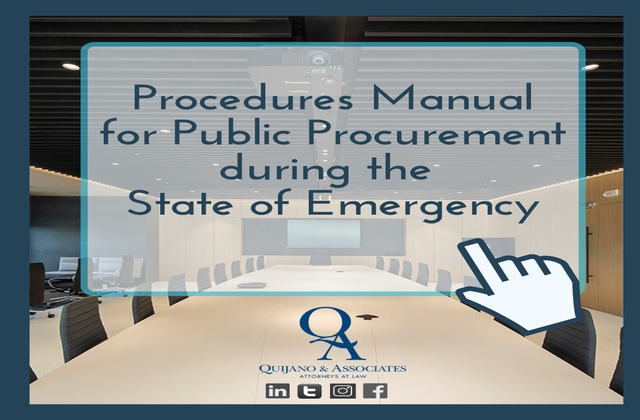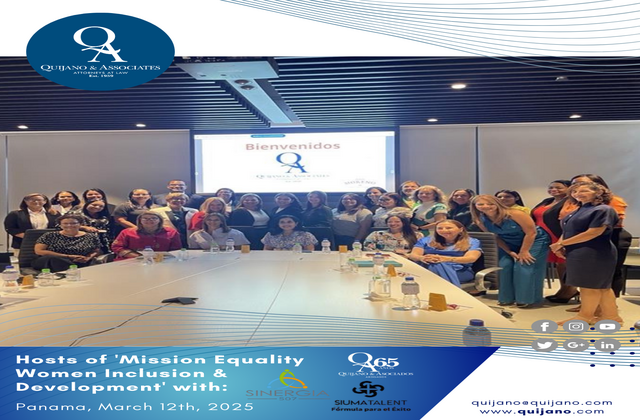Public Procurement and State of Emergency: Procedures Manual for Purchases in a State of Emergency

At Quijano and Associates, aware of the economic and health situation our country is facing due to the CoViD-19 pandemic, we continue to update all our clients and friends of the new measures established by our authorities.
The General Directorate of Public Procurement (DGCP) approved and published a Procedure Manual for Procurement in a State of Emergency, which is parameterized with Law 22 of June 27, 2006, ordered by Law 61 of 2017, which regulates public procurement. In said Manual, the DGCP established the steps and procedures to follow in order to formalize the acquisition of goods, services or works, since contracting with traditional mechanisms and procedures has become risky and in some cases impossible, taking into account the measures promulgated by the Executive related to holding public events.
In general, we can summarize that said manual stipulates and regulates two different procedures subject to the approval or not of the corresponding consignment:
- Special procedure for Urgent Acquisitions, which is processed directly at the Ministry of the Presidency (with approved consignment transfer).
- Exceptional Procurement Procedure (without the transfer of consignment approval – Numerals 2 and 5 of article 73 of Law 22 of June 27, 2006).
We will proceed to explain each of the indicated procedures.
a. ACQUISITIONS PROCEDURE IN A STATE OF EMERGENCY
As mentioned above, according to the manual approved by the General Directorate of Public Procurement, for the acquisition of goods, services or works in a State of Emergency situation, proceed as follows:
- The contracting institution must email covid19@presidencia.gob.pa requesting the allocation of the consignment to make the required purchase, using the authorized amount only and exclusively for the acquisition of goods, services or the contracting of works related to the declared state of emergency. The request must contain a clear description and identification of the object of the contract with its respective quotation of the good, service or work.
- After the request of allocation of the consignment for the acquisition has been made, two scenarios can be presented; In each of them, the steps indicated below must be followed according to the following order, until the identified need is met.
a.1. Procedure with approved consignment transfer:
In the event that the Ministry of the Presidency has carried out the initial transfer, the contractor selection procedures must be carried out in the following order:
a.1.1. First Assumption: Purchase by Catalog of Products and Services.
Goods and / or services from the Electronic Catalog of Products and Services must be purchased, provided that the supplier is in a condition to deliver them immediately, in order to attend to the emergency in a timely manner (Framework Agreement).
a.1. 2. Second Assumption: Purchase by Special Emergency Procurement Procedure in accordance with Article 79 of the Sole Text of the Law June 22, 2006.
If the required good or service is not found in the Catalog, or if there are reasonable reasons to acquire it outside of it, the entity will proceed as follows:
- They may request quotes using any technological or other means of communication, of the good, service or work that it requires, attaching to the file a supporting note, issued by the legal representative of the institution or the public servant to whom such function is delegated, in which they will register the steps that were taken and the reasons that made it impossible to acquire the goods or services from the Electronic Catalog of Products and Services.
- Once the quote or quotes have been received, the authorized institution or institutions will select the one that can handle the emergency in a timely manner and that is the most beneficial for the public interest.
- Once the purchase order or contract has been formalized, the authorized institution or institutions may receive the goods and / or services or proceed with the execution of works immediately.
Payment to the contractor will be made after the execution of the object of the contract and thus must be established in the purchase order or contract, as indicated in article 79 of Law 22 of June 27, 2006, ordered by Law 61 of 2017.
a.2. PROCEDURE WITHOUT APPROVED CONSIGNMENT TRANSFER OR EXCEPTIONAL PROCEDURE
In the event that the contracting institution is not authorized to allocate the authorized sum for the declared state of emergency, it must use its own funds or resources included in its budget for the acquisition of the goods, services or works required to its operation through the following procedures:
a.2.1. First Assumption: Purchase by Catalog of Products and Services.
They must acquire the goods and / or services from the Electronic Catalog of Products and Services, provided that the supplier is in a position to deliver them immediately, to handle the emergency in a timely manner.
a.2.2. Second Assumption: Purchase with Contract – For less than US$10,000.00
They will be able to manage their immediate needs through the procedure for minor contracts whose amount do not exceed US$ 10,000.00, provided in article 80 of Executive Decree No. 40 of 2018, which regulates Law 22 of 2006, ordered by Law 61 of 2017.
a.2.3. Third Assumption: Purchase by Exceptional Contracting Procedure (Art. 73. Number 2 and 5).
The evaluation and approval of contracts using this procedure (depending on the amount to be contracted) will be carried out by:
- The General Directorate of Public Procurement for amounts greater than ten thousand dollars (US$ 10,000.00), up to a maximum of three hundred thousand dollars (US$ 300,000.00). By email: dipec@dgcp.gob.pa.
- The National Economic Council for amounts that exceed three hundred thousand dollars (US$ 300,000.00) without exceeding three million dollars (US$ 3,000,000.00). By email to: cgrimaldo@mef.gob.pa – Contact: Cristina Grimaldo (CENA Secretary), Cell: 6493-2214.
- The Cabinet Council for amounts exceeding three million dollars (US$ 3,000,000.00), by email to ncarr@presidencia.gob.pa – Contact: Licda. Natalia Carr, Tel: 527- 9652.
Regardless of the institution at which the request for authorization of exceptional procedure is presented, the requesting institution must submit the information in a single file in PDF format.
The simplified and required information for this procedure is as follows:
- Memorial requesting the approval of the exceptional contracting procedure for the good, service or work that is required.
- Contractor’s offer or proposal.
- Simple photocopy of the personal identity card or passport of the natural person or legal representative (if it is a legal entity);
- Simple photocopy of the Public Registry Certificate. A screenshot of the Public Registry’s website is accepted, to be further verified.
- Simple photocopy of the current operation notice (except for the ones contemplated in Law 5 of January 11, 2007); which can be printed from www.panamaemprende.gob.pa
- Simple photocopy of the professional license or registration at the Technical Board of Engineering and Architecture (only in cases of public works: construction, building, demolition, remodeling and / or adaptation of real estate, as well as the supply and installation of goods that involve civil works);
- Simple photocopy of the Affidavit on Retorsion Measures.
OTHER RELEVANT MEASURES:
Other important measures that we can summarize from the Procedure Manual for Emergency Purchases are the following:
- The division of matter does not apply to contracts made by public institutions under the special procedure of emergency acquisitions, for which reason, the Government may divide the object of the contract until the authorized sum is reached.
- In emergency cases in which the acquisition of water and food intended for immediate consumption is necessary, the presentation of security deposits will not be required; however, the contractor must guarantee the contracting institution its obligation to respond for the defects of the acquired goods in the purchase order or contract.




